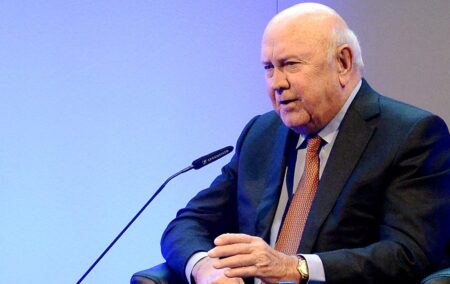The American Bar Association (ABA), in the face of protests, has cancelled an event at which former president FW De Klerk was to speak.
The ABA, a large voluntary association of legal practitioners, academics and students, had asked De Klerk to speak on the ‘rule of law, constitutional democracy, minority rights, social change, racism and global security’.
On Saturday evening, the ABA said that this would not go ahead.
In a subsequent statement, De Klerk’s spokesperson Dave Steward said the former president ‘withdrew his acceptance’ of the ABA invitation because he did not want to cause embarrassment to event organisers.
Steward said the allegation that he was involved in gross violations of human rights was ‘baseless’, citing the Truth and Reconciliation Commission.
He added: ‘However, it appears unacceptable in the current super-heated racial climate that any leader from South Africa’s troubled past should be permitted to retain the slightest vestige of honour.’
The ABA had been criticised for having invited De Klerk from a number of quarters. These included representations from Lukhanyo Calata, the son of Fort Calata, who – with three of his colleagues (the so-called Cradock Four) – were murdered by security policemen on 27 June 1985.
Calata argued that De Klerk bore some responsibility for the murder. ‘De Klerk’s hands are dripping with my father’s blood, and the blood of his comrades,’ he wrote to the ABA.
He said that De Klerk was present when the decision was taken to kill the men.
De Klerk has denied responsibility for such actions.
Also raised were comments in February in which the former president appeared to equivocate as to whether apartheid was a crime against humanity. The Pan African Bar Association attacked the invitation, calling him an ‘unrepentant apartheid apologist’.
Likewise, an American academic, Prof Ronald Slye of Seattle University, objected to the invitation, saying: ‘It contributes to the continued hold of systemic and institutional racism in South Africa, just as our inability to come to grips with the legacy of slavery, the Civil War, and Reconstruction does the same here in the US.’

